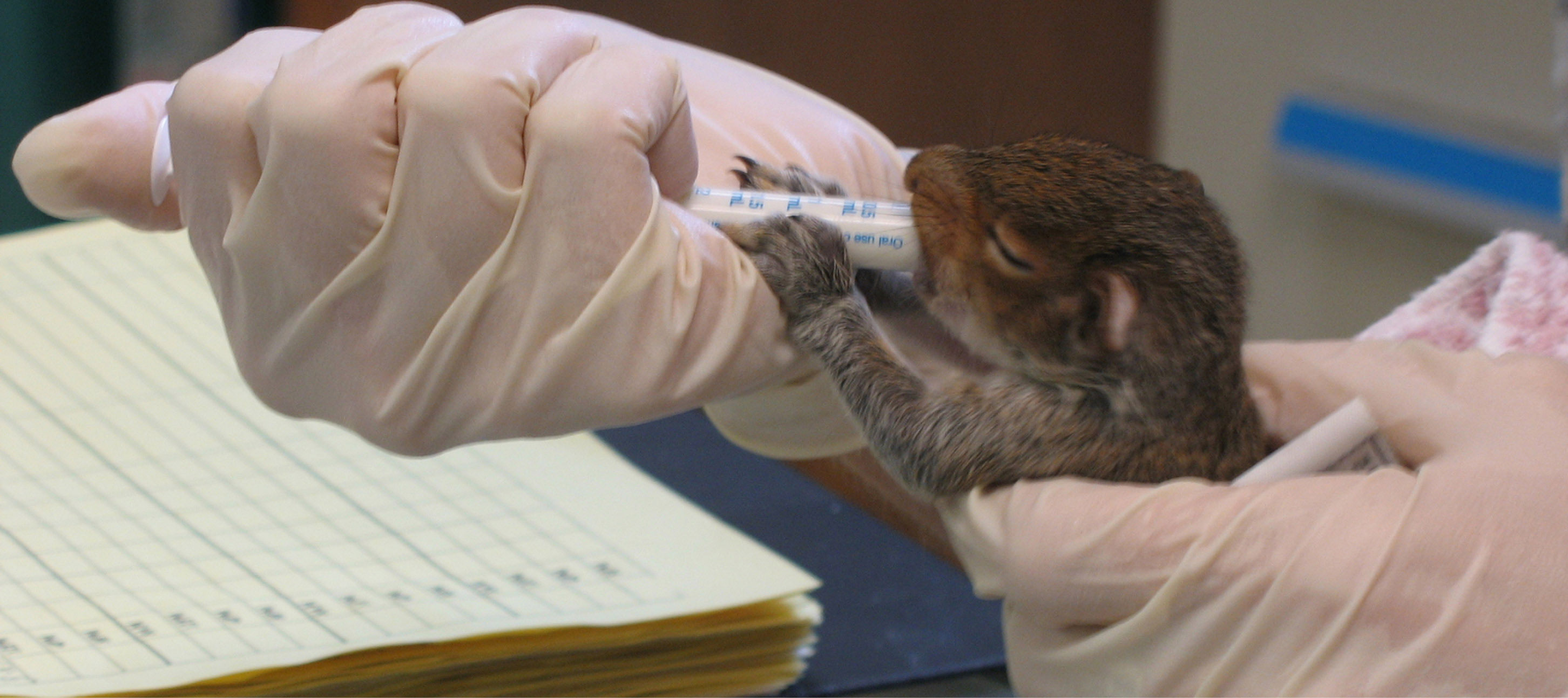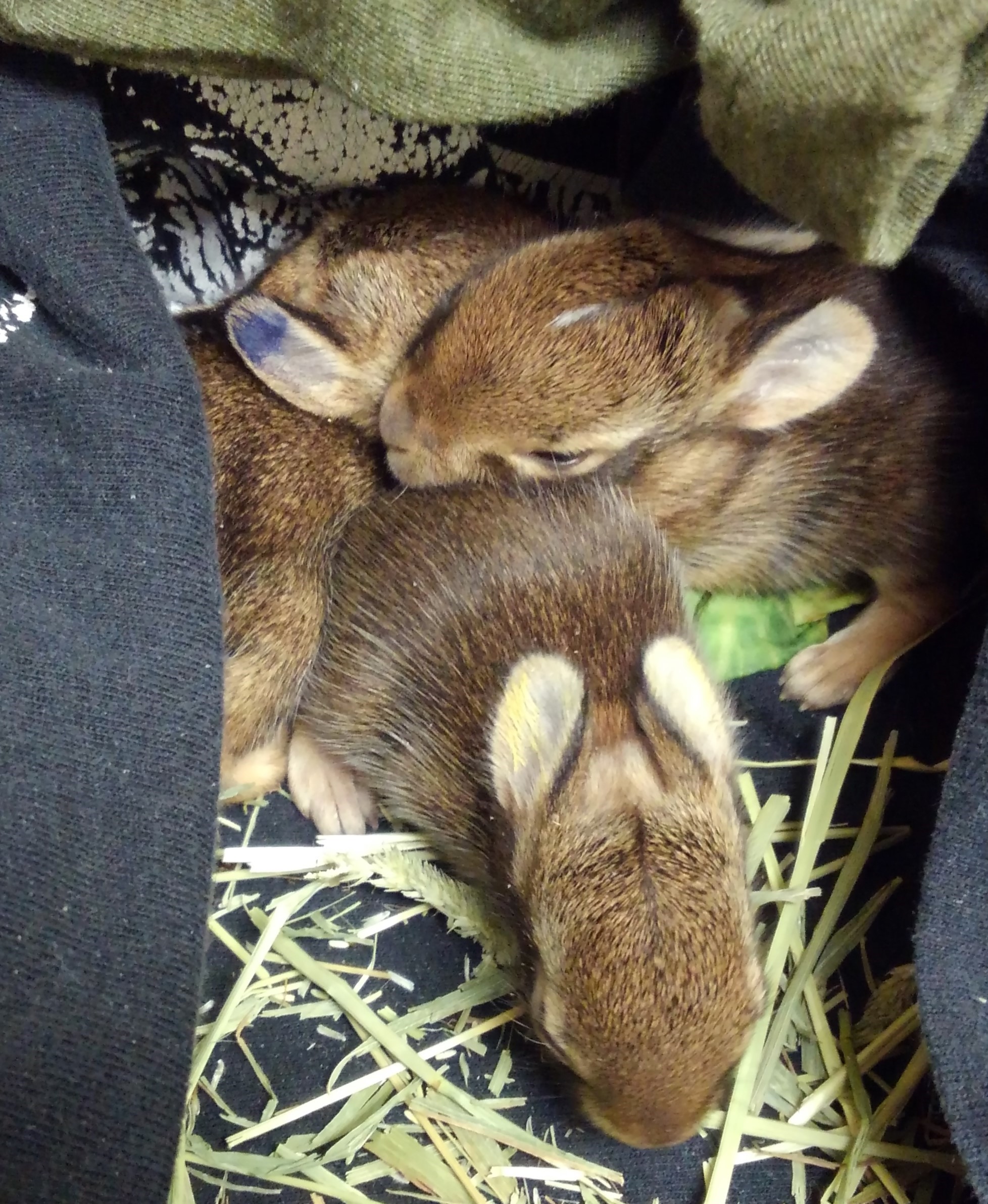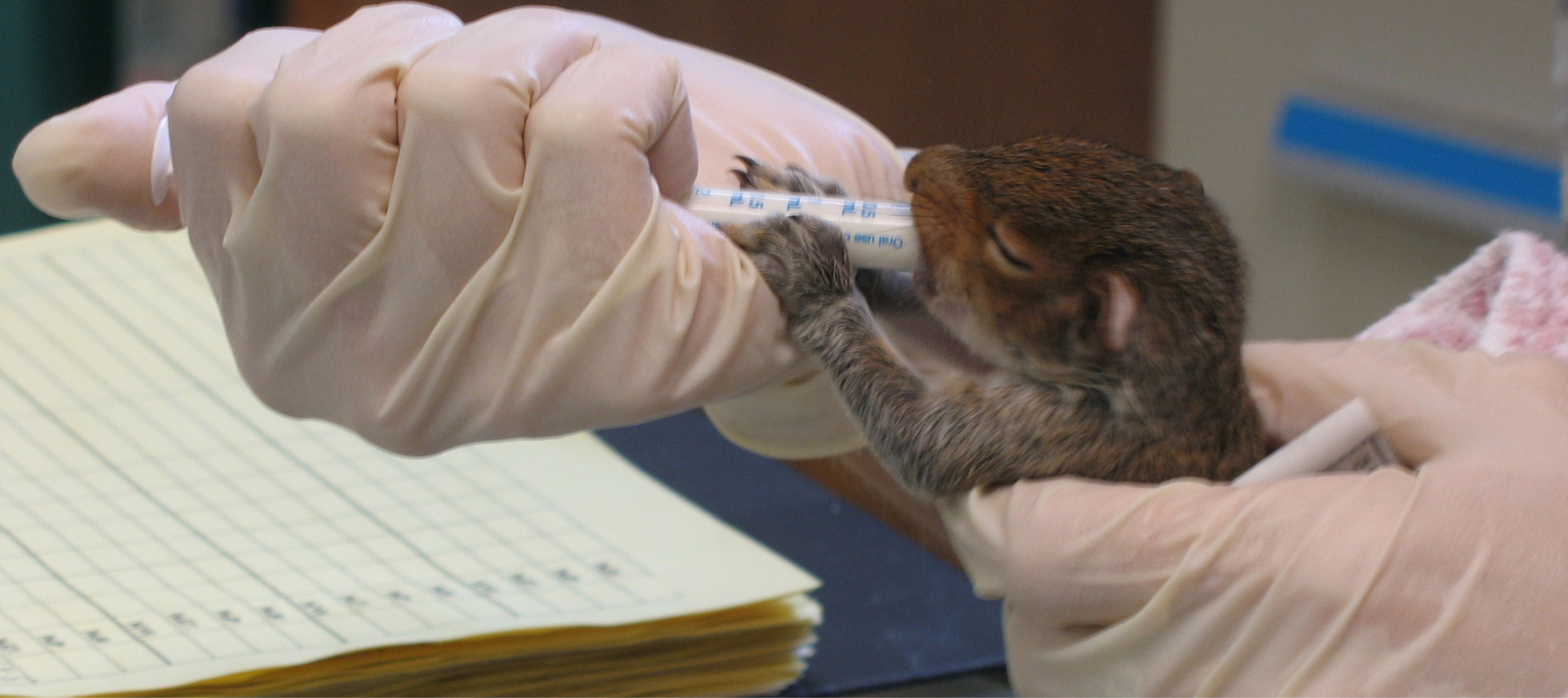
Wildlife rehabilitators are trained specialists who can provide the best quality of care for an injured animal.
- What is Wildlife Rehabilitation?
The goal of wildlife rehabilitation is to provide professional care to sick, injured, and orphaned wildlife so healthy animals can be returned to their natural habitat. In Pennsylvania, all permitted wildlife rehabilitators have demonstrated proficient knowledge of wildlife care by passing both written and oral examinations, have facilities that meet specific housing standards for the species they treat, work with a licensed veterinarian to provide professional medical care, and meet continuing education requirements.
The Wildlife Clinic at the Schuylkill Center makes every effort to meet or exceed the Minimum Standards for Wildlife Rehabilitation set forth by the National Wildlife Rehabilitators Association (NWRA) and the International Wildlife Rehabilitation Council (IWRC). Our professional staff and highly trained volunteers provide every patient with the best possible chance of returning to the wild.
- What kind of animals do you take care of?
Wildlife rehabilitators in PA must have a permit for every group of species they will rehabilitate. Currently, the Wildlife Clinic is permitted to accept native species including:
- Songbirds
- Waterfowl (ducks, geese)
- Raptors (owls, hawks, eagles)
- Small mammals (squirrels, chipmunks, opossums, cottontail rabbits, etc)
- Reptiles (non-venomous snakes, turtles)
- Amphibians (toads, frogs, salamanders)
The Clinic does not currently have permits to rehabilitate:
- Rabies vector species (foxes, coyotes, racoons, skunks, bats, groundhogs)
- White-tailed deer
To make the best use of our resources and in accordance with our mission, we only accept injured, orphaned, and ill native wildlife. We are not able to accept non-native, exotic, or domestic animals for care, nor are we able to assist in finding placement for or rehoming pets. If you need assistance for a domestic, exotic, or non-native species, please contact your local veterinarian or animal shelter.
The Wildlife Clinic is not permitted to provide care for:
- Domestic pets (cats, dogs, rabbits, ferrets, parrots, lizards, red-eared sliders, etc.)
- Farmed and domestic animals (goats, pigs, sheep, domestic ducks, chickens, racing pigeons, etc.)
- I think a wild animal needs help, what do I do?
Please call the Schuylkill Center Wildlife Clinic at 215-482-7300 (option 2).
The Wildlife Clinic is open 365 days a year and our wildlife hotline is monitored 24 hours a day.We do our best to respond to emergency calls as quickly as possible, but if staff are engaged with caring for animals, you may be asked to leave a message. Please leave your contact details and information about your wildlife emergency and we will get back to you promptly.
Your safety and that of the animal is very important to us. Try to observe the situation from a safe distance, and take note of what you are seeing such as the animal's exact location, obvious injuries, and the animal's behavior. Unless the animal is in immediate danger, do not try to pick up or move the animal until you have spoken with a professional who can guide you on the safest method of action.
- I found an animal, but I'm not in your area
To find the closest wildlife rehabilitator to you in Pennsylvania, visit the Pennsylvania Association of Wildlife Rehabilitators for a list of wildlife rehabilitators by county. For wildlife rehabilitators in other areas, Animal Help Now can help locate the nearest rehabilitation facility to you by zipcode.
- I have an injured animal, can you pick them up?
As a volunteer-based organization, the Clinic does not have the resources or staff to pick up animals, and relies on members of the public who find injured wildlife to transport them to our facility. Please call our wildlife hotline for assistance and advice on how to safely capture and transport wildlife.
Wildlife In Need Emergency Response of Pennsylvania is a state-wide dispatch network for injured, orphaned and sick wildlife within the state of Pennsylvania. If you need assistance with capture or transport of wildlife, please call (814) 414-4224
- How do I take care of this animal I found?
Please do not attempt to care for an injured or orphaned wild animal yourself. Do not give an injured or orphaned animal food or water.
Wildlife rehabilitators are not allowed to give advice to the public on how to care for animals. In addition to it being unlawful for a member of the public to possess a wild animal, wildlife have very specific requirements for their care. Rehabilitators are prepared to meet the specialized nutrition, housing, and medical needs of wild animals. If these needs are not met, the animal will have no chance of surviving to return to their natural habitat. If you have found an injured or orphaned wild animal, it is critical that you bring them to a wildlife rehabilitator as soon as possible.

Infant animals require specialized care- please do not attempt to feed a wild animal.
- What will happen to an animal that I bring to you?
Every animal that comes to the Wildlife Clinic receives a full physical exam on arrival to assess their injuries and overall condition. Animals which have injuries that can be treated receive medical care overseen by a veterinarian and a permitted rehabilitator. Wildlife in care are given medications, specialized diets, appropriate housing, and anything else they may need for recovery. Prior to release, every animal is examined and assessed to ensure they are prepared to survive on their own.
Wildlife will often come into the Clinic in poor condition and with severe injuries or illnesses. While we make every effort to help each animal that comes to us, not every patient will recover to the point that they could be successful in the wild. In these cases, the most humane and caring service we can provide is a painless end to their suffering.
- Can I visit the Wildlife Clinic?
As a wildlife hospital, our first priority is the well-being of the animals; we are very careful to limit our patients' exposure to people to ensure minimal stress. Stress and shock are very dangerous and can have a significant negative impact on an animal's chances of a successful recovery.
The Clinic is not open to visitors and we do not offer regular tours of our facility. You can view behind the scenes videos of daily clinic operations by following us on social media.
The Schuylkill Center for Environmental Education welcomes visitors to enjoy the hiking trails, art gallery and Discovery Center. For more information, see the Visiting and Hours page.
- How can I help?
The Wildlife Clinic relies on dedicated volunteers to carry out the daily care of animals as well as maintaining the cleanliness and operations of our hospital. For more information on volunteering with the wildlife clinic, visit our Volunteer page.
The clinic depends on the generous support of donors and foundations to help us meet the needs of the animals. Support for the clinic comes in many forms, including donations of supplies, constructing cages and nesting boxes, and collecting natural food items. For more ways to help, please visit Support the Wildlife Clinic.
The Schuylkill Center for Environmental Education welcomes visitors to enjoy the nature trails and Discovery Center. For more information, see the Visiting and Hours page.
 |

|



